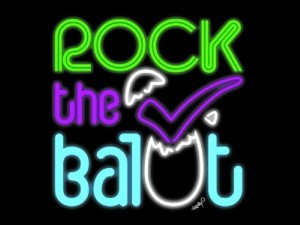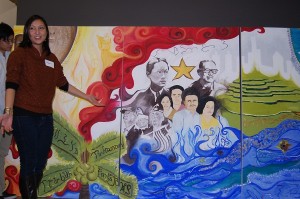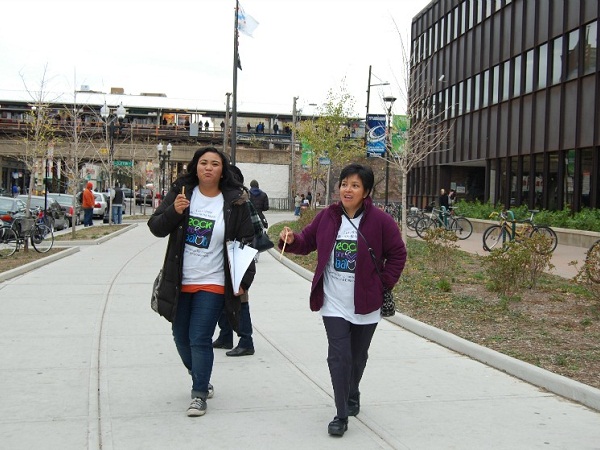Rock the Balut: Filipino Americans as a political force
 SAN FRANCISCO – “Rock the Balut.” No, it’s not some quirky game show on television, or the name of new hiphop band.
SAN FRANCISCO – “Rock the Balut.” No, it’s not some quirky game show on television, or the name of new hiphop band.
For Filipinos in America, Rock the Balut was a bright spot in the last US elections. And it potentially could play an important role in electoral contests in the coming years.
Rock the Balut was the campaign geared to getting US Filipinos to vote in the last election season. The effort was inspired and led by Filipino Americans, many of them veteran community organizers and political activists.
The name, of course, is a play on “Rock the Ballot” or “Rock the Vote.”
“When we rock the ballot, we rock the vote,” Jerry Clarito, a Manila native who is now a veteran community organizer in Chicago told me. “We shake the voters towards the selection of a name after careful deliberation and prudent education.”
The campaign just started. But ‘Rock the Balut’ and its partner organizations — AFIRE, or Alliance of Filipinos for Immigrant Rights and Empowerment, and FAJ, or Filipino Americans for Justice — appear to be gaining traction at a critical time.
That’s because the last elections demonstrated the power of the minority vote, particularly Latinos and Asians. That, in turn, has turned the spotlight on an issue important to Filipinos: immigration.
This is where “Rock the Balut” can play a role.
Now, there have been other get-out-the-vote campaigns in the past. But Clarito says those were “usually contained and triggered by the election cycles.” But the new campaign is aimed at “increasing voter participation on progressive issues, those that advance civil and immigrant rights locally, statewide and nationally.”
In other words, the idea is not just to elect candidates and win elections. Rock the Balut wants to turn Filipino Americans into a political and electoral force.
A great idea, of course. But one that will take years to turn it into a reality.
One hurdle is the attitudes of Filipino Americans toward elections and voting. Clarito said a problem the Rock the Balut is taking on is “smashing the baggage of the experience/perception of Philippine corrupt (vote buying) and dirty elections (rigged results).”
Another challenge is FilAm attitudes toward immigration. Clearly, there is no united Filipino American view on this issue, particularly on how undocumented immigrants should be treated.
In fact, during the election, one of the common arguments presented by Filipino Americans opposed to Barack Obama was his policy allowing the children of undocumented immigrants to remain the US. (You can get a flavor of the more extreme and intolerant sentiments in the comments in my last column.)
Illegal immigration has long been a divisive issue in the community. In the 1990s, some Filipinos joined the bandwagon in the campaign against undocumented immigrants, even though a harsh crackdown would also affect fellow Filipinos.
Many Filipinos still take a hard-line stance on this issue, endorsing policies and campaigns which they see as aimed mainly at Latinos.
“Like many big issues, the community is still processing the best way to handle the immigration issue,” Clarito said. “My experience is mostly a learning engagement. There are Filipinos who can see beyond the limited framework of ‘wait in line’ and classifying people based on visa status. The key is to engage the community and to reference the current immigration issue to our community’s historical experience.”
Lillian Galedo of Filipino Americans for Justice also stressed the importance of digging deeper into the immigration debate beyond party politics. In fact, she’s been critical of the Obama administration’s handling of immigration.
“I think we have to wage a strong campaign to bust the myth that immigrants are criminals, justifying the oppressive enforcement programs that Obama and Bush before him conducted,” said Galedo, whose parents were immigrants from Bohol who came to America as farm workers.
Fortunately, she said, that view isn’t that widely shared in the Filipino American community.
“I don’t think it’s a widespread belief,” she told me. “I do think younger Filipinos are coming to this awareness via the educational system and involvement in organizing campaigns as well as through their interaction with people who have been the target of enforcement programs.”
History, Clarito also pointed out, is key.
He cited a recent meeting with Filipinos in Chicago, including many elderly immigrants.
“I asked if they really know the meaning of attaching the word ‘illegal’ to a person who did not commit any criminal act,” Jerry recalled. “Many said that they are using the word because that’s what they read from the newspaper and hear/see from watching the news.”
During the meeting, it came out that one of the participants, a nurse, was once an undocumented immigrant, a tago nang tago, but eventually became legalized when the laws changed.
“Immigration policies do change according to the needs of America,” Jerry told them. “The anti-immigrants are aggressive in criminalizing the immigrants but Filipinos should fight this kind of negative sentiment.”
He explained to me, “The discussion on ‘illegal’ immigrants was redirected on to how to address the ‘biases’ perpetuated in the community.”
Again, an emphasis on history.
 Jerry said he often talks about the journey of Filipinos in America, from the time of the farm worker migration in the early part of the 20th century, including prominent figures like the writer and labor leader Carlos Bulosan.
Jerry said he often talks about the journey of Filipinos in America, from the time of the farm worker migration in the early part of the 20th century, including prominent figures like the writer and labor leader Carlos Bulosan.
In fact, the Rock the Balut campaign has featured a mural with the image of Bulosan prominently displayed.
“Most of the time the Filipinos I engaged with moved to support the issue of broader immigration reform when the issue is put within the framework of our own experience,” he said, “from the early Filipino farm workers exported to work in the American farms, from the Bulosans of the world, to the struggle of veterans to be recognized, to the health care professionals recruited to take care of American patients and teachers recruited to teach inner city kids to the tourists who dared to become out of status, to the Dreamers and to their parents who are taking all the risks to better the lives of their families, and to those who painstakingly waited for more than twenty years to get reunited with their families.”
“There are more Filipinos willing to open the discussions to look for solutions than stick with anti-immigration sentiment,” he continued. “I think this due to the realization that the experience of exclusion based on skin color can easily happen to us. This is an objective factor that swings the needle to more pro-immigration sentiment.”
Follow on Twitter @BoyingPimentel. Like the Kuwento page on Facebook HERE.















